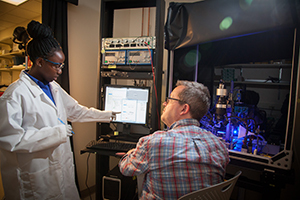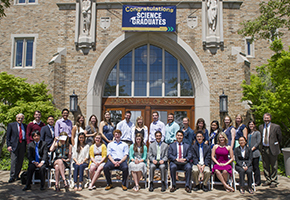Materials
Program
One objective of the Virtuous Scientist Project is to establish an integrated program to promote intellectual virtue among scientists in education and training.
Such a program would attempt to do several things:
First, make the implicit more explicit with respect to intellectual virtue. For example, during class enable instructors to make a direct link between what is being taught and specific intellectual virtues.

Second, encourage faculty to provide instruction about individual virtues, and allow opportunities for students to both reflect and practice individual master intellectual virtues. For example, by providing students with assignments that encourage intellectual virtue, such as curiosity or tenacity, and then include time for students to reflect on those assignments and whether they exhibit intellectual virtue.
Third, use exemplars from real life to illustrate both intellectual virtues and vices. Moreover, tailoring the exemplars used to the audience being considered. One of the biggest challenges in sciences is the preponderance of white males in the discipline, especially those that are famous for their contributions, such as Aristotle, Galileo, Dmitri Mendeleev, and Charles Darwin. Individuals of other genders and ethnicities have also made important contributions to science, such as Hypatia, Caroline Herschel, Srinivasa Ramanjun, Dorothy Hodgkin, Katherine Johnson, Lynn Margulis, Abdus Salam, and Percy Julian. Moreover, there are many individuals outside of science that can also provide exemplars of intellectual virtue. Thus, there is a need to provide a diversity of exemplars of intellectual virtue that are local and global, in both space and time.

Fourth, development of a community of practice that includes faculty, students, and staff at any given institution, but should also be multi-institutional. All participants would commit to promote and develop intellectual virtue through their own actions, especially while interacting with others and through their mentorship.
Specific Objectives
Book: The Virtuous Scientist. This book, in development, will provide a source of material for both students and faculty interested in becoming better acquainted with intellectual virtue in science.
Course: Courses will be developed, including materials to facilitate intellectual virtue development by undergraduate and graduate students.
Discussion Groups
Under the auspices of the Virtuous Scientist Project, several discussion groups have been organized.
Internal Advisory Group - whose objective was to identify how intellectual virtue can be developed in science students at the institutional level.
Kevin Barry, Director, Kaneb Center for Teaching and Learning
John Duffy, Associate Professor, Dept. of English, Director of the Writing Center
Terrence Ehrman, C.S.C. Assistant Director, Center for Religion, Science and Human Flourishing
Dan Hubert, Assistant Director, Kaneb Center for Teaching and Learning
Matthew Kloser, Director, Center for STEM Education
Amy Langenkamp, Assistant Professor, Dept. of Sociology and Institute for Educational Initiatives
Daniel Lapsely, Professor, Dept. of Psychology, and Institute for Educational Initiatives
Kristin Lewis, Associate Teaching Professor, Dept. of Biological Sciences
Cecilia Lucero, Academic Advisor, First Year of Studies, Co-Director, Balfour-Hesburgh Scholars Program
Joseph O’Tousa, Professor, Dept. of Biological Sciences
Science Working Group – whose objective was to identify what can be done within the College of Science to promote intellectual virtue
Patricia Clark, Professor, Dept. of Chemistry and Biochemistry
Malgorzata Dobrowolska-Furdyna, Professor, Dept. of Physics, Associate Dean of Undergraduate Studies, College of Science.
Kristin Lewis, Associate Teaching Professor, Dept. of Biological Sciences
Nancy Michael, Assistant Teaching Professor, Dept of Biological Sciences
Joseph O’Tousa, Professor, Dept. of Biological Sciences
Jim Parise, Associate Teaching Professor, Dept. of Chemistry and Biochemistry
Sylwia Ptasinska, Associate Professor, Dept. of Physics
Dominic Vachon, Ruth M. Hillebrand Director, Center for Compassionate Care in Medicine
Steven Wietstock, Associate Teaching Professor, Dept. of Chemistry and Biochemistry
Biological Sciences Graduate Working Group - whose objective was to identify how intellectual virtue can be developed in Biolgical Sciences graduate students.
Whitney Conard, Graduate Student, Lamberti Lab, Dept. of Biological Sciences
Martha Dee, Graduate Student, Tank Lab, Dept. of Biological Sciences
Brandon Gerig, Graduate Student, Lamberti Lab, Dept. of Biological Sciences
Brittany Hanrahan, Graduate Student, Tank Lab, Dept. of Biological Sciences
Rachel Oidtman, Graduate Student, Perkins Lab, Dept. of Biological Sciences
Katherine O'reilly, Graduate Student, Lamberti Lab, Dept. of Biological Sciences
Arial Shogren, Graduate Student, Tank Lab, Dept. of Biological Sciences
Quirine TenBosch, Graduate Student, Perkins Lab, Dept. of Biological Sciences
Carmella Vizza, Graduate Student, Lamberti Lab, Dept. of Biological Sciences
Jacob Zwart, Graduate Student, Jones Lab, Dept. of Biological Sciences
Assessment Tools
Focus Groups
Survey
Consultation
Links to those involved in studying and promoting intellectual virtue:
• Jason Baehr
• Christian Miller
• Richard Paul
• Robert Pennock
• Rob Roberts
• Nancy Snow
• Jay Woods
• Linda Zagzebski